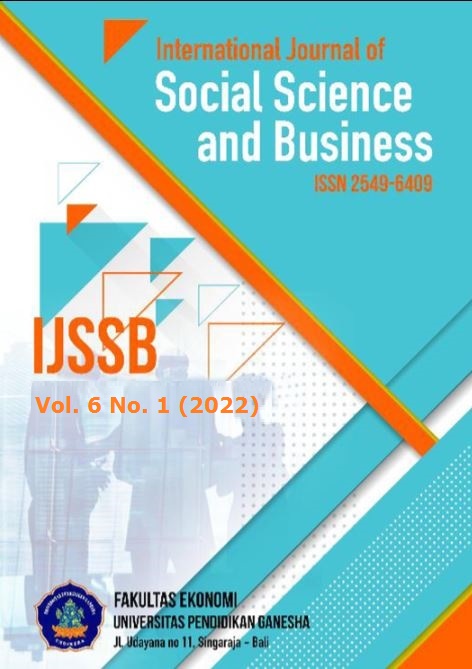Digital Transformation Strategy for Handicraft SMEs during the Covid-19 Pandemic in Gianyar Regency, Bali
DOI:
https://doi.org/10.23887/ijssb.v6i1.36190Keywords:
Strategy, inovation, SMEs, Resilience, InnovationAbstract
Salah satu tantangan terbesar bagi UMKM selama pandemi Covid-19 adalah bertransformasi ke teknologi digital. Beberapa tantangan besar tersebut antara lain yaitu, tingkat konektivitas ekosistem digital masih terbatas. Kajian ini bertujuan untuk memperdalam strategi yang dilakukan UKM kerajinan anyaman dalam beradaptasi dengan dunia digital di masa pandemi Covid-19. Transformasi digital bagi UMKM merupakan keharusan di masa pandemi saat ini, namun juga tidak terlepas dari tantangan yang mengiringinya. Para pelaku UMKM kerajinan tenun khususnya memiliki strategi yang harus menghadapi berbagai kendala. Salah satu kendala terpenting adalah sulitnya beradaptasi dengan teknologi digital, dalam hal ini pemasaran online dalam berbagai bentuk. UMKM dipaksa untuk merancang strategi untuk memasuki ekosistem digital. Artikel ini berpendapat bahwa UMKM akan diuji ketahanannya di tengah krisis untuk mengeksploitasi sumber daya mereka dan mengambil langkah-langkah inovatif. Artikel ini menjadikan pengrajin tenun di Kabupaten Gianyar sebagai subjek penelitian. Metode pengumpulan data dilakukan dengan observasi dan wawancara mendalam. Klasifikasi dan analisis data dilakukan dengan menggunakan prinsip metode kualitatif.
References
Aarikka-Stenroos, L., & Ritala, P. (2017). Network management in the era of ecosystems: Systematic review and management framework. Industrial Marketing Management, 67, 23–36. https://doi.org/10.1016/j.indmarman.2017.08.010.
Acs, Z. J., Stam, E., Audretsch, D. B., & O’Connor, A. (2017). The lineages of the entrepreneurial ecosystem approach. Small Business Economics, 49(1), 1–10. https://doi.org/10.1007/s11187-017-9864-8.
Al-Abri, M. Y., Rahim, A. A., & Hussain, N. H. (2018). Entrepreneurial ecosystem: An exploration of the entrepreneurship model for SMEs in Sultanate of Oman. Mediterranean Journal of Social Sciences, 9(6), 193–193. https://www.richtmann.org/journal/index.php/mjss/article/view/10344.
Audretsch, D. B., & Belitski, M. (2017). Entrepreneurial ecosystems in cities: establishing the framework conditions. The Journal of Technology Transfer, 42(5), 1030–1051. https://doi.org/10.1007/s10961-016-9473-8.
Carayannis, E. G., & Campbell, D. F. J. (2010). Triple Helix, Quadruple Helix and Quintuple Helix and How Do Knowledge, Innovation and the Environment Relate To Each Other? International Journal of Social Ecology and Sustainable Development, 1(1), 41–69. https://doi.org/10.4018/jsesd.2010010105.
Chandler, G. N., DeTienne, D. R., McKelvie, A., & Mumford, T. V. (2011). Causation and effectuation processes: A validation study. Journal of Business Venturing, 26(3), 375–390. https://doi.org/10.1016/j.jbusvent.2009.10.006.
Conrad, E., & Cassar, L. F. (2014). Decoupling economic growth and environmental degradation: reviewing progress to date in the small island state of Malta. Sustainability, 6(10), 6729–6750. https://www.mdpi.com/81528.
Etzkowitz, H., & Klofsten, M. (2005). The innovating region: toward a theory of knowledge‐based regional development. R&D Management, 35(3), 243–255. https://doi.org/10.1111/j.1467-9310.2005.00387.x.
Etzkowitz, H., & Leydesdorff, L. (1995). The Triple Helix--University-industry-government relations: A laboratory for knowledge based economic development. EASST Review, 14(1), 14–19. https://papers.ssrn.com/sol3/papers.cfm?abstract_id=2480085.
Etzkowitz, H., Ranga, M., Benner, M., Guaranys, L., Maculan, A. M., & Kneller, R. (2008). Pathways to the entrepreneurial university: towards a global convergence. Science and Public Policy, 35(9), 681–695. https://academic.oup.com/spp/article-abstract/35/9/681/1673248.
Henrekson, M., & Sanandaji, T. (2014). Small business activity does not measure entrepreneurship. Proceedings of the National Academy of Sciences, 111(5), 1760–1765. https://www.pnas.org/content/111/5/1760.short.
Isenberg, D. (2011). The Entrpreunership Ecosystems Strategy as a New Paradigm of Economics Policy: Principle for Cultivating Entreprenuership. Babson Global.
Jacobides, M. G., Knudsen, T., & Augier, M. (2006). Benefiting from innovation: Value creation, value appropriation and the role of industry architectures. Research Policy, 35(8), 1200–1221. https://doi.org/10.1016/j.respol.2006.09.005.
Jennen, T., Rigby, C., & Allum, J. (2016). Stakeolder Engagement in the creation of an entrepreneurial ecosystem. Journal of Asia Entrepreneurship and Sustainability, 12(1), 3. https://www.proquest.com/openview/8c4940e540007867f0848023c8d7fc13/1.
Jurado, T., & Battisti, M. (2019). The evolution of SME policy: the case of New Zealand. Regional Studies, Regional Science, 6(1), 32–54. https://doi.org/10.1080/21681376.2018.1562368.
Krueger, N. F., & Carsrud, A. L. (1993). Entrepreneurial intentions: Applying the theory of planned behaviour. Entrepreneurship & Regional Development, 5(4), 315–330. https://doi.org/10.1080/08985629300000020.
Malecki, E. J. (2011). Connecting local entrepreneurial ecosystems to global innovation networks: open innovation, double networks and knowledge integration. International Journal of Entrepreneurship and Innovation Management, 14(1), 36–59. https://doi.org/10.1504/IJEIM.2011.040821.
Mason, C., & Brown, R. (2014). Entreprenuerial Ecosystem and Growth Oriented. OECD.
Mirzanti, I. R., Simatupang, T. M., & Larso, D. (2015). Entrepreneurship policy implementation model in Indonesia. International Journal of Entrepreneurship and Small Business, 26(4), 399–415. https://doi.org/10.1504/IJESB.2015.072765.
Olugbola, S. A. (2017). Exploring entrepreneurial readiness of youth and startup success components: Entrepreneurship training as a moderator. Journal of Innovation & Knowledge, 2(3), 155–171. https://doi.org/10.1016/j.jik.2016.12.004.
Reymen, I., Berends, H., Oudehand, R., & Stultiëns, R. (2017). Decision making for business model development: a process study of effectuation and causation in new technology‐based ventures. R&D Management, 47(4), 595–606. https://doi.org/10.1111/radm.12249.
Sarasvathy, S. D., & Dew, N. (2005). New market creation through transformation. Journal of Evolutionary Economics, 15(5), 533–565. https://doi.org/10.1007/s00191-005-0264-x.
Sondari, M. C. (2014). Is entrepreneurship education really needed?: Examining the antecedent of entrepreneurial career intention. Procedia-Social and Behavioral Sciences, 115, 44–53. https://doi.org/10.1016/j.sbspro.2014.02.414.
Spigel, B., & Harrison, R. (2018). Toward a process theory of entrepreneurial ecosystems. Strategic Entrepreneurship Journal, 12(1), 151–168. https://doi.org/10.1002/sej.1268.
Stam, F. C., & Spigel, B. (2016). Entrepreneurial ecosystems. USE Discussion Paper Series, 16(13). https://dspace.library.uu.nl/handle/1874/347982.
Wanita, N. (2015). Perkembangan Usaha Mikro, Kecil dan Menengah (UMKM) di Pasar Manonda Palu. Istiqra: Jurnal Hasil Penelitian, 3(2), 250–279. https://jurnal.iainpalu.ac.id/index.php/ist/article/download/220/147.
Downloads
Published
How to Cite
Issue
Section
License
Copyright (c) 2022 International Journal of Social Science and Business

This work is licensed under a Creative Commons Attribution-ShareAlike 4.0 International License.











